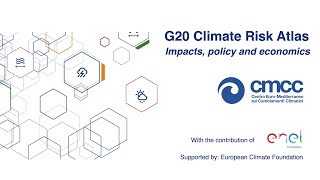G20 Climate Impacts Atlas

- Copyright infringement is not intended
Context: In A new report from the Euro-Mediterranean Center on Climate Change (CMCC), the leading Italian research centre on climate change and National Focal Point for the IPCC, has said that climate impacts will “tear through G20 countries’’ and will play out in the world’s richest economies, without urgent action to reduce emissions.
G20 Climate Impacts Atlas
- It collates scientific projections that the rising temperatures and intense heatwaves could cause severe droughts, threatening essential water supplies for agriculture, causing huge loss of human life and increasing the chance of deadly fires.
- In India, the report finds, declines in rice and wheat production could spark economic losses of up to 81 billion Euros and a loss of 15% of farmers’ incomes by 2050.
- Heatwaves in India will last 25 times longer by 2036-2065 if emissions are high (4°C), over five times longer if global temperature rise is constrained to about 2°C, and one and a half times longer if emissions are very low and temperature rise only reaches 1.5°C.
- Even assuming sufficient water and nutrient supplies, not including the impact of climate change on pests or diseases, or extreme events such as floods or storms, and including a strong effect of CO2 fertilization, sugarcane, rice, wheat, and maize yields in India would be set to fall as the climate warms.
- In reality, these conditions may not be met, for example water demand for agriculture is likely to rise around about 29% by 2050 – meaning yield losses are likely to be underestimated, finds the report.
- Furthermore, on a pathway to 4°C global heating, agricultural drought will become 48% more frequent by 2036-2065.
- On a 2°C pathway (the maximum temperature agreed by the Paris Agreement) this drops to 20% more frequent, and constraining temperature rise to 1.5°C (the aspirational goal of the Paris Agreement), agricultural drought will still be 13% more frequent.
- Potential fish catch could fall 8.8% by 2050 if emissions are low, and 17.1% if they are high.
- Just under 18 million Indians could be at risk of river flooding by 2050 if emissions are high, compared to 1.3 million today.
- Total labour is expected to decline by 13.4% under a low emissions scenario by 2050 due to the increase in heat, and by 24% under a medium emissions scenario by 2080.
- Heatwaves could last at least ten times longer in all G20 countries, the study says, with heatwaves in Argentina, Brazil and Indonesia lasting over 60 times longer by 2050.
- The report finds that without urgent action to reduce carbon emissions, GDP losses due to climate damage in G20 countries increase each year, rising to at least 4% annually by 2050.
- This could reach over 8% by 2100, equivalent to twice the bloc’s economic losses from Covid-19.
- Some countries will be even worse hit, such as Canada, which could see at least 4% knocked off its GDP by 2050 and over 13% by 2100.
- The research shows that in Europe, deaths from extreme heat could rise from 2,700 per year to 90,000 each year by 2100 on a high emissions pathway.
- By 2050, potential fish catch could fall by a fifth in Indonesia – uprooting hundreds of thousands of livelihoods.
- Sea level rise could wreck coastal infrastructure within 30 years, with Japan set to lose €404 billion and South Africa €815 million by 2050, on a high emissions pathway.
https://indianexpress.com/article/india/report-finds-g20-countries-and-richest-economies-will-be-hit-by-climate-impacts-7594177/



1.png)
